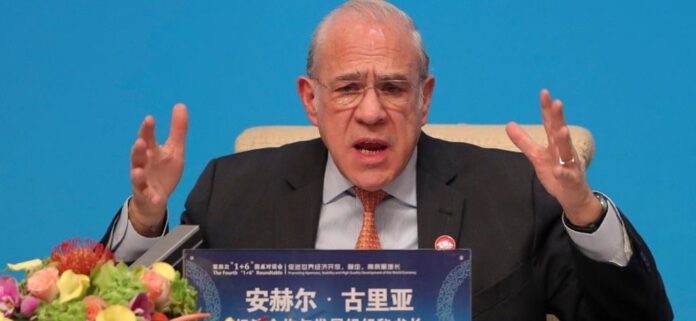The world will take years to recover from the coronavirus pandemic, the Organisation for Economic Co-operation and Development has warned.
Angel Gurría, OECD secretary general, said the economic shock was already bigger than the financial crisis.
He told the BBC it was “wishful thinking” to believe that countries would bounce back quickly.
The OECD has called on governments to rip up spending rules to ensure speedy testing and treatment of the virus.
Mr Gurría said a recent warning that a serious outbreak could halve global growth to 1.5pc already looked too optimistic.
While the number of job losses and company failures remains uncertain, Mr Gurría said countries would be dealing with the economic fallout “for years to come”.
He said many of the world’s biggest economies would fall into recession in the coming months – defined as two consecutive quarters of economic decline.
“Even if you don’t get a worldwide recession, you’re going to get either no growth or negative growth in many of the economies of the world, including some of the larger ones, and therefore you’re going to get not only low growth this year, but also it’s going to take longer to pick up in the in the future,” he added.
Big shock
Mr Gurría said the economic uncertainty created by the virus outbreak meant economies were already suffering a bigger shock than during the September 11 terror attacks or the 2008 financial crisis.
He said: “And the reason is that we don’t know how much it’s going to take to fix the unemployment because we don’t know how many people are going to end up unemployed. We also don’t know how much it’s going to take to fix the hundreds of thousands of small and medium enterprises who are already suffering.”
Governments around the world have taken unprecedented steps to support workers and businesses during the outbreak.
Policymakers in the UK have pledged to pay the wages of employees unable to work due to the coronavirus pandemic.
Mr Gurría called on governments to rip up borrowing rules and “throw everything we got at it” to deal with the crisis.
However, he warned that bigger deficits and larger debt piles would also weigh on heavily indebted countries for years to come.
No quick recovery
Mr Gurría said that just weeks ago, policymakers from the G20 club of rich nations believed the recovery would take a ‘V’ shape – with a short, sharp drop in economic activity followed swiftly by a rebound in growth.
“It was already then mostly wishful thinking,” he said.
“I do not agree with the idea of a ‘V’ shaped phenomenon … Right now we know it’s not going to be a ‘V’. It’s going to be more in the best of cases like a ‘U’ with a long trench in the bottom before it gets to the recovery period. We can avoid it looking like an ‘L’, if we take the right decisions today.”
The OECD is calling for a four-pronged plan to deal with the outbreak, including free virus testing, better equipment for doctors and nurses, cash transfers to workers including the self-employed and tax payment holidays for businesses.
Mr Gurría compared the level of ambition to the Marshall Plan – which helped to pay for the reconstruction of Europe after the Second World War.




